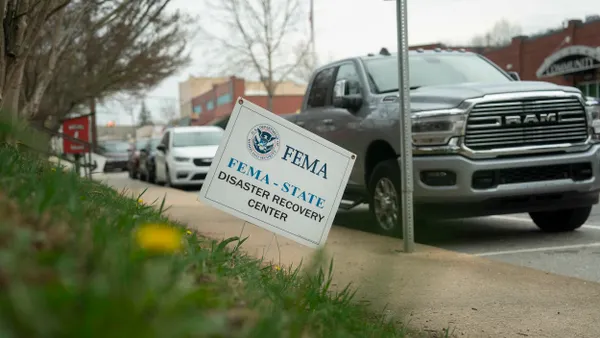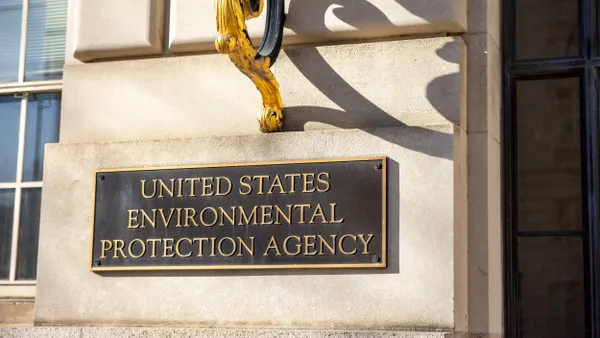Dive Brief:
- The World Economic Forum (WEF) has released its annual report, The Global Risks Report 2018, which uses survey data gathered from 1,000 respondents to assess the likelihood and impacts of 30 global risks over the next 10 years.
- Environmental risks topped the list for the second consecutive year, followed by cyber threats, geopolitical tension and economic strain.
- In addition to naming the top risks, the report also indicated that the urgency surrounding the threats has intensified, with 59% of survey respondents pointing to increased risks in 2018 and 7% believing risks will be lower this year.
Dive Insight:
The report examined a variety of environmental threats and indicated that they have drastically grown in importance over the report's 13-year history. It highlights that environmental concerns are interconnected with many other risks, such as water crises.
Extreme weather events, such as last year's record-breaking string of hurricanes, are of particular concern. Similarly, extreme temperatures in 2017 have intensified attention to climate change; NASA just announced that last year was the second hottest on record, with 2016 remaining in the top position. The WEF report cautions that extreme weather and temperatures will have profound and costly effects not only for the cities hit by weather events, but heat-related issues also cause widespread disruptions, such as to agricultural systems and food supply.
Air, soil and water pollution moved further into the danger zone. The report states that 90% of the world's population now lives with polluted air, and that has contributed to about 10% of human deaths around the world. The announcement in 2017 that carbon emissions had risen for the first time in four years increased the urgency to act to stop climate change.
Researchers put cybersecurity at the forefront of concerns in part because cyber attacks have nearly doubled in the last five years. The rapid acceleration in the use of Internet of Things connected devices — both by individuals and cities — creates more opportunities for cyber attacks. Attacks on connected infrastructure and industrial sectors are expected to increase and that has the potential to cause public panic and chaos. Some U.S. cities and states have recognized the importance of preventing cyber attacks and are seeking more secure ways of integrating IoT technologies.
The report highlights geopolitical concerns related to increased personal power and state-centered politics, stating: "Charismatic strongman politics is on the rise across the world." While it specifically names U.S. President Donald Trump and North Korean leader Kim Jong Un, it also notes similar themes in countries including Turkey, Saudi Arabia, the Philippines, China, Russia and Japan. Survey respondents worried that leaders' attitudes and actions could lead to conflicts, such as nuclear war.
The report indicates that economic strain is less prominent than during the time following the financial crisis. However, income inequality is growing — especially in advanced economies — and that causes economic destabilization. A recent report from the National League of Cities also warned of instability in cities caused by increasing social and economic inequity.
The WEF report contends that humans are able to mitigate simple risks but are less adept at eliminating complex risks. Repeated stress to complex systems can cause systems — societal, economic and environmental — to lose their ability to rebound. Researchers indicate that working toward greater resiliency measures in complex systems will help to prevent these systems from completely collapsing and doing widespread damage.










